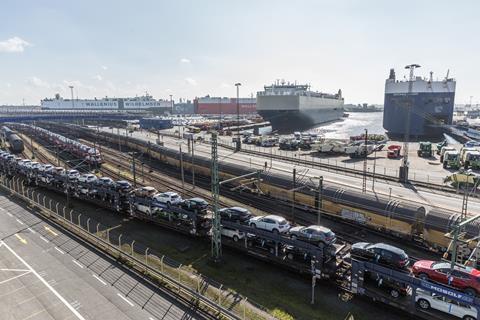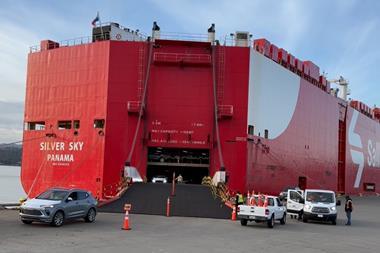BLG Logistics managed 4.4m vehicles across its network in 2024, including 1.3m through Bremerhaven port, down 15% on the previous year, but higher demand for technical services has helped sales revenue and a new inland terminal will open in July this year.
In its annual results for financial year 2024, BLG Logistics Group achieved greater sales in its Automobile division compared to 2023, generating €687.5m ($766.4; +7.1% m), but volumes in vehicle handling and transport saw a decline last year because of carmaker problems and a general economic downswing.

The German logistics provider managed 4.4m vehicles across its network in 2024, down from around 5m in 2023 because of “economic and geopolitical framework conditions”.
At its automotive terminal at the port of Bremerhaven (BLG AutoTerminal Bremerhaven) the company processed 1.3m vehicles, which represented a 15% drop in volumes on the previous year, again because of the economic climate, according to the company. The split between imported and exported vehicles was approximately 50:50.
At the same time, however, BLG was able to report more positive earnings in transport because of increased demand for technical services and “various special effects [which] compensated for the reduced volumes”.
According to Axel Bantel, managing director and global director of sales for the Automobile division, the increased demand for technical services is related to a shift away from traditional car ownerships.
“Cars used to be sold primarily to end customers, but today leasing, fleet management and subscription models dominate,” he said. “Manufacturers are keeping vehicles for longer, making reconditioning, return and resale more important. This increases the logistics and space requirements as well as the demand for fleet and remarketing services - an area in which we are contributing our expertise and growing.”
Prospects for US trade
Recent US trade policy, including tariffs on vehicle imports and fees on China-related shipping, is causing uncertainty for global businesses, with European vehicle exports to and imports from the US affected. Protectionist policy threatens activity through the major European vehicle handling ports, including Bremerhaven, and Bantel said BLG was looking at various scenarios.
BLG AutoTerminal Bremerhaven is a global transshipment centre and only partially dependent on the European-American trade route but the US market does account for around 30% of the vehicles imported and exported through Bremerhaven, according to BLG.
“We are currently calculating various scenarios for a possible decline of up to 15%,” said Bantel, adding that the reactions of its OEM customers, the German government and the European Union will be crucial to that future trade. “Protectionist trade barriers such as punitive tariffs or non-tariff barriers have a direct impact on demand and therefore on exports, imports and ultimately the prosperity of both economies,” said Bantel.
Bantel said it is BLG’s job to adapt flexibly to new market conditions but noted that protectionism and nationalist isolation are not the answer. “Free trade remains indispensable, especially for Germany as an export nation,” he added.
Ahlhorn inland terminal
Despite the drop in vehicle numbers processed across the network last. year, in 2024 BLG announced it would build another inland vehicle terminal in Ahlhorn, Germany. The site is currently being developed on 355,000 sq.m of land with capacity for 15,000 vehicles. Operations will start on July 1 this year and the site will provide handling and technical services. BLG already has inland terminals in Germany at Duisberg and Kelheim.
“Automotive manufacturers are increasingly outsourcing more activities to us as a service provider,” said Axel Krichel, member of the executive board and chief operating officer. “That already had a positive impact in the reporting year. We see an opportunity to further expand this business at our terminals.
Fleet decarbonisation
In terms of its sustainability goals across the company divisions – Automobile, Contract and Container – BLG reported that it exceeded its target for 2024 and achieved a reduced in carbon emissions of 17.4% compared to 2018. Last year the Automobile division implemented various measures to reduce CO₂ emissions, according to the spokesperson.
“In the reporting year, we maintained a fleet of 200 trucks, 100% of which comply with the Euro 6 standard,” said a company spokesperson. “By acquiring 48 efficient new vehicles and continuously renewing the fleet, the average consumption was reduced to 29.3 litre/100 km.”
In addition, the company has been working on driver training and optimised route planning to help reduce carbon expenditure. BLG has also been looking at decarbonising heavy-duty transport by testing hydrotreated vegetable oils – HVO100 – in vehicle transport.
BLG has also switched to energy efficient LED lamps at its car terminals and in Bremerhaven it has made its heating system more climate friendly. From 2025 onwards, BLG said it will switch to green electricity across the group.
Contract and container
In its Contract division BLG stated that the difficult overall economic situation and downturn in vehicle component and industrial logistics business impacted sales revenue and earnings. Earnings decreased by €33.5m to €535.6m and the company said there is currently there is no sign of a market recovery in the short term, though it continues to attract new business.
There were more positive results in the Container division, with a 12% increase on the previous year to €61.2m. The company said that result is based on a 10.2% increase in sales across the terminals in the Eurogate network. “Earnings were boosted not only by one-off balance sheet effects, but also by the crisis in the Red Sea which disrupted shipping schedules and increased storage fees and reefer income,” said the company in a statement.
Dividing the waters: European finished vehicle ports review
- 1
- 2
 Currently reading
Currently readingFinished vehicle numbers down at Bremerhaven but BLG boosts sales and invests in inland terminal
- 3
- 4
- 5
- 6
- 7













































No comments yet